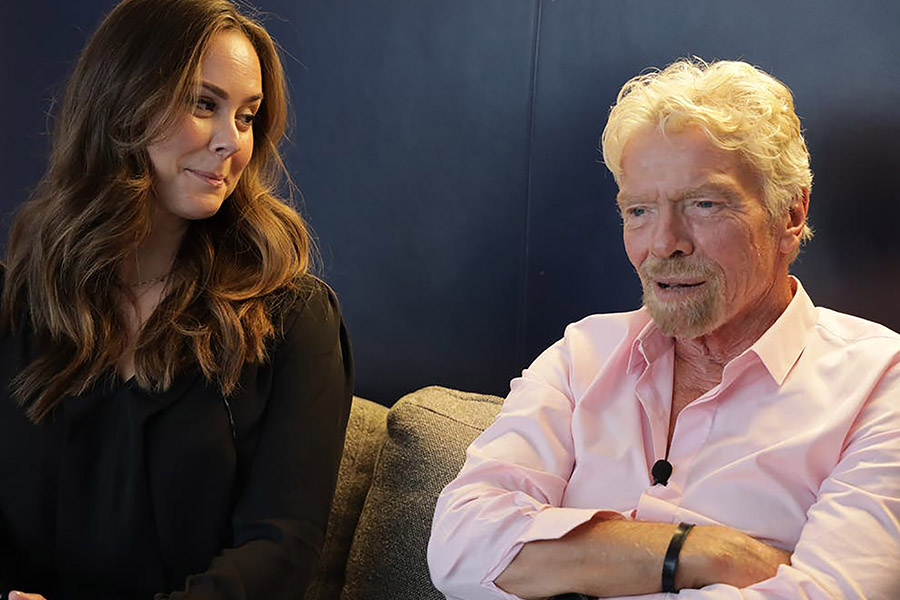When employers and investors speak up, lawmakers pay attention. The Responsible Business Initiative for Justice (RBIJ) was founded in 2017, and the award-winning nonprofit has partnered with hundreds of companies across the world to advance fairness and quality in systems of punishment and incarceration.
By engaging businesses to use their voices, resources, and working practices, the organization has worked to change criminal justice narratives, support legislation, and create real opportunities for deserving individuals.
Founder and CEO Celia Ouellette (pictured above with Richard Branson) spent a decade practicing as a defense attorney, primarily on capital cases across the United States. As a lawyer, she found herself constantly fighting a criminal justice system that was cruel, expensive, racist, and broken. Despite working to save people from execution, she could only help individuals one at a time. “It’s not enough to pull people from the river one by one,” she often reminds conference audiences. “We have to go upstream and change the system — so they don’t fall in the river in the first place.”
When it came to delivering systemic change, Ouellette recognized that businesses could make a difference. No constituency is as important to lawmakers, and it was clear that business support would be decisive in driving policy campaigns over the line. So RBIJ was set up to rally and strategically deploy that support.
Across the United States, there is an established and growing need for companies to speak out. Six in ten Americans feel that it’s no longer acceptable for companies to remain silent on social issues. The same number says they will reward businesses that actively address these issues. The past two years have been a reckoning for the American justice system, and its flaws are now recognized as some of the most glaring social problems facing the United States today.
An excellent example is Business Leaders Against the Death Penalty, which RBIJ launched at the South by Southwest Festival in 2021. Spearheaded by Virgin Group founder Sir Richard Branson, the campaign brought together more than 250 international business leaders to back an end to capital punishment around the globe. Supporters include Meta COO Sheryl Sandberg, Salesforce CEO Marc Benioff, Unilever CEO Alan Jope, and author and entrepreneur Arianna Huffington. Their support has already been deployed in campaigns from Utah to Singapore through op-eds, interviews, joint statements, and private advocacy. In addition, the campaign has been covered by over 250 media outlets in more than 10 countries. By amplifying business support for change, we have helped shift narratives around criminal justice issues and given campaigners invaluable ammunition for advancing reform.
We’ve also convinced businesses that criminal justice reform isn’t just a moral or a reputational imperative for companies – it’s an economic one. Take The Clean Slate Initiative as another example; it closes certain types of criminal records after a specific time. The group’s motto is: A criminal record shouldn’t be a life sentence to poverty. The United States loses more than $80 billion each year from the underemployment of people with criminal records. One in three American adults now has a record and faces substantial and often wholly unnecessary work, education, and housing barriers. Removing these restrictions for deserving individuals who have done their time will automatically allow employers access to a vast, diverse, underutilized talent pool. With over 11 million vacant jobs to fill in the Great Resignation, it’s a strategy that could benefit businesses greatly.
This demonstrates another critical aspect of criminal justice reform — marshaling key business voices to support specific local policy campaigns. Last year, for example, RBIJ brought together companies to help end juvenile life-without-parole sentencing in Ohio. It was an essential step forward; no other country sentences children to die in prison. We worked closely with state campaign partners on the ground to end this cruel practice.
We also work with employers to create change within their operations, most notably through hiring. In March 2022, again at South by Southwest, we launched Unlock Potential with the support of the Walmart.org Center for Racial Equity. The program is a groundbreaking intentional employment initiative to keep young people away from encounters with the justice system. By providing meaningful, long-term career opportunities for individuals aged 16 to 24 (who are most at risk), Unlock Potential aims to break cycles of poverty and incarceration while at the same time advancing economic mobility and racial equity.
Our work at RBIJ has never been more critical. While the United States makes up just 4% of the global population, it accounts for 21% of its prisoners. The country’s justice system is rightly decried as inefficient, wasteful, cruel, and racist. Internationally, lack of access to stable and accountable justice systems remains “a great threat to sustainable development,” according to the United Nations. There is an existential need for corporations to “walk their talk” on issues like systemic racism and embrace their responsibility as a force for good. We work with them to do precisely that.




































